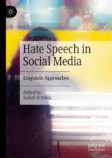Search
Search Results
-
To Be Native or Not to Be Native: That Is Not the Question
The Lucky Anglophone Scholar Doctrine as the privileged orthodoxy in the domain of scholarly publication portrays Anglophone scholars as an...
-
Does the availability of orthography support L2 word learning?
Availability of orthography during word learning has been found to facilitate learning the word’s spelling and pronunciation and has been proposed to...

-
Building and Analysing an Online Hate Speech Corpus: The NETLANG Experience and Beyond
This preliminary chapter is part of the Introduction to the book, “Online Hate Speech: Object, Approaches, Issues”, and it has a threefold purpose....
-
Hate Speech in Poland in the Context of the War in Ukraine
This chapter discusses examples of assumed hate speech against Ukraine and Ukrainian people as observed in Poland since the beginning of the war that...
-
Introduction
This chapter introduces the topic of the book, the intersection of language and social justice, and provides a general description of the Hawaiian...
-
How sensitive are adults to the role of morphology in spelling?
In English, the letters in a word’s spelling are sometimes associated with its part of speech or morphological structure. For example, final /ɨk/ and...

-
Participation in Publishing: The Demoralizing Discourse of Disadvantage
The dominance of English in global academic publishing has raised questions of communicative inequality and the possible ‘linguistic injustice’...
-
Japanese free choice items as unconditionals
This article examines syntactic and semantic properties of free choice items (FCIs) in Japanese. It is argued that Japanese FCIs, which have been...

-
The Expansion of Cantonese Over the Last Two Centuries
Cantonese is the representative variety of Yue Chinese. Since the end of the First Opium War (1839–1842), a large number of Cantonese people have...
-
The Expansion of Cantonese Over the Last Two Centuries
Cantonese is the representative variety of Yue Chinese. Since the end of the First Opium War (1839–1842), a large number of Cantonese people have...
-
Opening the Conversation on Intersectional Issues in LGBTQ+ Studies in Applied Linguistics
This chapter opens this volume by considering the current state of LGBTQ+-focused research and scholarship in the discipline of applied linguistics...
-
Vowel nasalisation in Scottish Gaelic: No evidence for incomplete neutralisation in initial mutation
The existence of incomplete neutralisation in connection with processes like final devoicing is well-known, but little work exists on typologically...

-
Lexical Profiles of Student Academic Presentations
Some of the main functions of speech adjustment are to manage comprehension and accessibility of information in order to lighten listeners’...
-
Russian feminitives: what can corpus data tell us?
Recent years have seen considerable debate concerning Russian feminitives, i.e. derived formations that designate female professionals, such as advokatka...

-
The lexical core of a complex functional affix: Russian baby diminutive -onok
Like other syntactic elements, affixes are sometimes said to be heads or modifiers. In Russian, one suffix, -onok , can be either: as a head, it is a...

-
Second Tip: Diversify the Curriculum
This chapter offers language teachers a second tip when working online: to take advantage of the internet as a vehicle for increasing curriculum...
-
The Phenomenology of Experiencing Oneself Online: Critical Dimensions of Identity and Language Use in Virtual Spaces
The emerging arrays of online environments readily accessible constitute primary settings through which routine constructions of identity are curated...
-
The Negotiation of Meaning: Communication Strategies and Identities
The central topic of this book, meaning and the negotiation of meaning, is introduced and positioned within the broader research context in this...
-
Family Language Policy: Promoting Partnership in the Early Years to Support Heritage Languages
In this chapter, Tina Hickey reflects on the significance of wide-ranging changes in family structure and childcare arrangements in the context of...
-
Survey of Books and Guides on Academic Presentations
The chapter provides a survey of a number of books and guides on academic presentations, published between 2000 and 2017. The main objectives of the...
